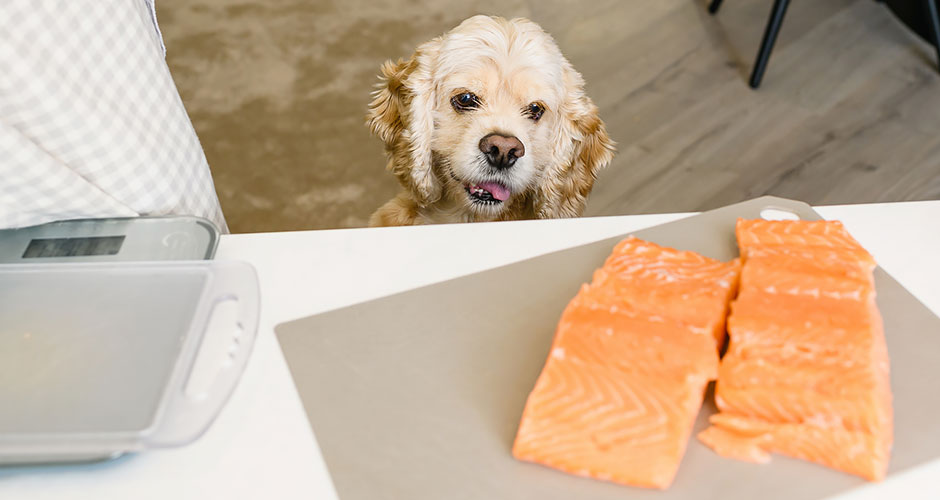Can Dogs Eat Raw Fish? What Dog Parents Should Know About Salmon Poisoning in Dogs

Fish can be a delicious, highly nutritious addition to your dog’s diet. It’s full of antioxidants, healthy fats, and protein. But while many dogs seem to benefit from consuming raw foods, eating certain types of raw fish can put them at risk for a potentially serious illness known as salmon poisoning.
Learn what types of fish can cause salmon poisoning, what symptoms to look out for, and how to safely source, prepare, and feed fish to your dog.
What Is Salmon Poisoning?
Salmon poisoning disease (SPD) actually describes an infection that’s neither a type of poisoning nor limited to salmon.
It’s caused by a type of bacteria called neorickettsia helminthoeca, a bacteria carried by a parasite found in freshwater fish called flatworm fluke or nanophyetus salmincola.
Freshwater fish found along the Pacific Northwest are known to potentially carry flatworm fluke parasites infected with neorickettsia helminthoeca bacteria.
How Do Dogs Get Salmon Poisoning?
Salmon poisoning occurs in dogs that have consumed raw salmon, trout, or Pacific giant salamanders that carry the infected parasite.
Dogs are at risk for consuming infected fish sourced from a supermarket, raw, freshly caught fish that their humans may bring home after a fishing trip, or fish that they find and consume when playing off-leash at a lake.
Can Dogs Get Salmon Poisoning From Sushi?
No, dogs cannot get salmon poisoning from sharing your sushi.
Salmon used to prepare sushi is frozen at extremely cold temperatures to destroy parasites. However, like many raw meat and fish sources, there’s a risk of sushi containing pathogens like salmonella or listeria, especially if improperly prepared or stored.
Can Dogs Get Salmon Poisoning From Dog Food?
No, dog food that contains salmon as a protein source will not cause salmon poisoning. There’s no need to worry when feeding salmon-based kibble or canned dog food, which is processed to remove parasites and pathogens.
What Happens If A Dog Contracts Salmon Poisoning?
If your dog consumes raw or undercooked wild fish sourced from the Pacific Northwest, contact your veterinarian right away. According to the Merck Veterinary Manual, symptoms like vomiting, diarrhea, lethargy, and a high fever may show up within five to seven days.
Without treatment, salmon poisoning can be fatal in about two weeks after your dog consumes fish containing infected parasites. Salmon poisoning can be treated with a dewormer, antibiotics, and IV fluids. With treatment, your dog is likely to make a full recovery.
How To Safely Feed Your Dog Fish
While salmon poisoning can be serious, it’s relatively rare in dogs.
The bacteria is only found in wild salmon, trout, and Pacific giant salamanders in the Pacific Northwest. The parasites and bacteria can be killed by cooking fish to an internal temperature 150 degrees Fahrenheit.
When feeding your dog fish, cook to eliminate parasites and bacteria, and remove all scales and bones before offering it to your dog.
Watch your dog closely if you bring them to the lake to swim or on fishing trips, and keep fresh, wild-caught fish out of reach, especially if you live in the Pacific Northwest.
Also try premium salmon dog food or raw freeze-dried salmon treats for a delicious, nutritious addition to your dog’s diet.





